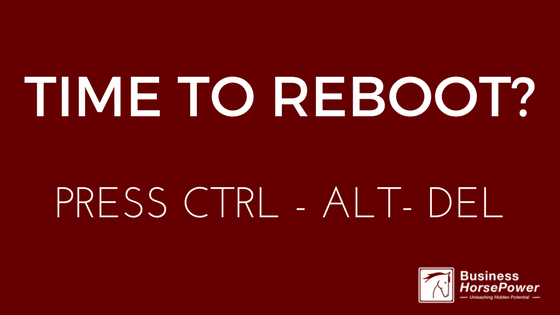
by Julia Felton | May 4, 2017
Firstly, many apologies for this week’s Wednesday Wisdom being a day late. As you might have seen my computer had a major meltdown yesterday and threw my day into disarray. It’s amazing what happens when you don’t have a computer. I literally couldn’t do anything. It was super frustrating and I kept battling on but everything took ages to do.
Basically, in a nutshell what had happened was that my computer had been infected with some adware that meant that every time I hit return on my keyboard it automatically took me to another page. After hours of frustration I finally called my lovely computer man who came out at 7pm at night – now that is what I call customer service – and after 2 hours finally managed to fix it. What was interesting was that on face value everything looked fine on my computer. There were no rogue files in the usual places and no illegal programmes installed.
Eventually, through trial and error, he found the pesky bug embedded deep within a seemingly innocuous add in for my internet browser. There was nothing about the add in on face value that seemed malicious and yet it clearly was the cause of all the problems. He had to reboot everything to make everything work again and I’m delighted to say I am now back in business.
Reflecting on this incident I have been fascinated to see the parallels between what happened with my computer and what I observe happening to some of my clients. I’m sure you have often heard the brain being referred to as being the operating system of your body. It is what makes everything run smoothly and just like my computer everything on the surface can appear fine, but then from a dark, hidden corner of your mind some limiting beliefs come up that just prevent you from taking action. Just like the adware did to me. Examples of some limiting beliefs could be fear of public speaking, fear of sales conversations or fear of being visible in your business.
The irony is that those limiting beliefs, many of which you are unconscious of, were embedded whilst you were growing up. They are hidden deep in your psyche and can be very difficult to detect, but rest assured they are impacting everything you do. When you come across them there is nothing else to do but deal with them head on, and if you can’t detect them, then find an expert who can help you, just like I did with my computer man.
Of course, once you have detected the limiting belief and removed them you can then reboot your system. Just like your computer slows down if you leave it turned on for too long, so does your mind and body. That is why sleep is so important to help renew and refresh us. But sometimes you just need to do a ctrl-alt-delete and just reboot everything and restore it to factory settings. Ironically that is what I had recently decided to do with my health. So on Monday I started a 90-day reboot programme. I’m curious to see what happens over these next 90 days as I reset my body to stop craving sugar and carbohydrates. I’m sure my energy levels will soar and I will get more motivation as well as release some excess weight. I’ll keep you posted on how it goes.
The same principles also apply to your business. Sometimes your business needs a reboot or a jump start to get it into action which I why I am delighted to be offering one day Jump Start Your Business Intensive Days with me. We’ll analyse what is working and not working in your business and then create a plan to move forward so that we can get your business into flow. To find out more just give me a call. You can book into my diary here.
And as an added incentive to get to into action I have decided to offer a massive 40% reduction on my normal fees for anyone booking and paying in full before 12th May. So if you’ve ever wanted to work with me but thought you couldn’t afford it, now is the time to take action. Simply book in for a call and let’s start rebooting your business.
I can’t wait to hear from you.
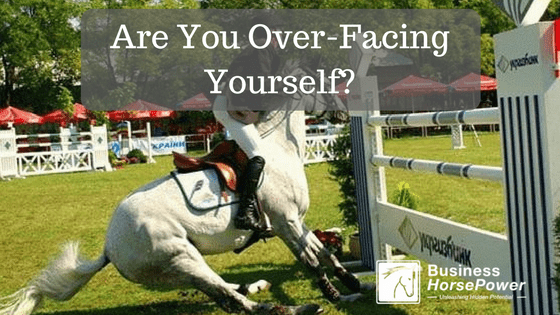
by Julia Felton | Apr 26, 2017
Are you over-facing yourself? By that I mean are you setting goals for yourself that simply aren’t realistic. Now don’t get me wrong I am all for setting bold goals that stretch you and help you achieve more than you ever thought was possible. Your goals need to take you out of our comfort zone so that you can grow, but not be so big that they simply are not achievable or worst still put you into the fear zone.
Today’s post has been inspired by a client that I was having a strategy call with this week and it reflects that I have been noticing a lot with my clients recently. You see what happened is at the beginning of the year they set all these goals, and now with one third of the year gone, they are becoming disillusioned that they are not achieving all that they had hoped for.
There is a reason that goals are SMART and SMART stands for:
S – specific
M – measurable
A – achievable
R – realistic
T – timely
What you intend to achieve needs to expand your horizons but it shouldn’t be so audacious that it sends you into the fear zone, where terror sets in and leaves you paralysed, so you end up doing nothing.
I realized that is what has been happening with me and my pony Bracken training for the Wobbleberrries challenge. To believe I could teach my horse to jump 90cm from having no jumping experience at all, to teach her to canter and be balanced in the riding arena, to learn how to go to other venues and compete alongside horses she has never met, now that is a big ask. On reflection that is just too bold to achieve within 9 months. It was a step too far, and so what has happened is that I really haven’t moved forward. I’ve become paralysed by the enormity of the task and so I have not been taking action.
I’m sure you’ve all heard the adage “how do you eat an elephant? One bite at a time” and this is the same approach we need to take to business and achieving goals. We need to take the first step. If we make that step too big then we won’t take any action but when we make the first step achievable and realistic and we are successful then our confidence grows. With renewed confidence we start gaining momentum and the second step seems easier, and then the third and fourth.
Little actions get results. So in the case of the work with Bracken, step one needs us to be able to master canter and get balanced, then I can add step two jumping, and then step three going to other venues. Broken down this way the goal seems achievable and realistic, something that I can do. So my goal for May is to master cantering in the arena. This is not something that is over-facing me and yet ensures that I am moving forward towards the ultimate goal. So my intention remains to complete the Wobbleberries challenge but realistically this year might not be possible, so next year it is. What is important is that I am moving forward towards that goal.
For the client who I was speaking with on that strategy call, what we established was that they needed some structure and accountability in their business. In fact because she had no structure she was procrastinating and going round in circles not moving her business forward. This was leading to a lack of confidence and self-esteem issues. Trust me I get this. When we get out of flow and start spiraling in a circle (I call this the tumble dryer effect where you are going round and round and going no where) it can be very demotivating.
So I’ve asked her to create her project list for May and share this with me so I can keep her accountable to achieving her goals. She was excited at this prospect and in the same moment I just knew she was going to over-face herself and create a massive list of goals would be nigh on impossible to achieve. Metaphorically, she was going to try and jump Beehers Brook (a large jump in the Grand National measuring nearly 5 foot) when in fact her first step was just to jump 50 cm!.
Sure should she set the intention of achieving a goal like jumping Becher’s Brook, hell yes, but just realise that to achieve this it takes many small steps. And the great thing about setting small goals and then achieving them is that it builds your confidence and self-esteem whilst also creating momentum. And we all know that the more momentum that we have the faster we will travel. When we are stuck in business taking the first few steps to move forward are always the toughest. Think an airplane. It uses 50% of its fuel simply to get off the runway! And it’s the same in business, the first few goals take time and energy as we need to put the groundwork in to make them happen, but once we have done that we can soar.
So today’s question is where are you over-facing yourself in life and business and what is just one small step that you can take to move forward? Trust me being in action and moving forward is way better that being in that tumble dryer going round and round in circles!!!
And if you need some help with your business then please reach out to me and secure one of the limited number of strategy sessions I offer each month.
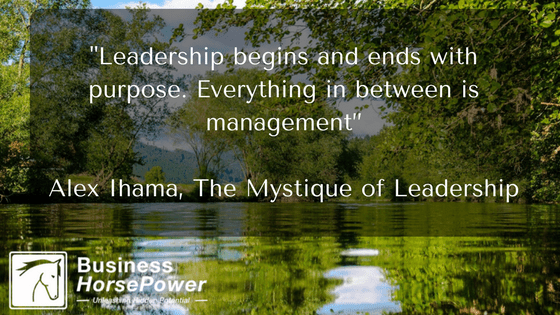
by Julia Felton | Apr 12, 2017
Have you ever stopped to consider what drives you? What gets you out of bed in the morning? What gives you motivation and inspiration to keep on going in the face of adversity? The answer to the question is purpose. The reason why you do what you do. And this is why everything in business starts and ends with purpose. If as leaders we don’t define the purpose for the business, then the business is like a rudderless ship. It has no direction, no GPS, and team members don’t know what is happening.
Purpose gives team members a shared vision. It unites the team behind a single cause. It brings clarity and certainty. It helps define the values for the business, as they need to be aligned with the purpose. And business values help decision making as they provide a framework that identifies which activities you will pursue. If following an opportunity or undertaking an activity conflicts with your values then it is easy to say No, as that action is out of alignment with what you stand for.
Purpose stands at the core of everything that we do in business and right now there is a growing trend, as companies become more consciously aware, for them to become purpose-driven. Purpose is being put clearly front and centre of everything a company does. And let’s be clear, the purpose is not self-serving, for example, to make more profits. That’s not motivating to anyone. Companies focusing on becoming purpose led are recognizing that business is a force for good and are focusing on how the business impacts and contributes to society generally.
An example of a company with a great purpose is Whole Foods. Their purpose, which they call their declaration of independence is clearly written on their website and pervades everything they do.
It states: Whole Foods Market is a dynamic leader in the quality food business. We are a mission-driven company that aims to set the standards of excellence for food retailers. We are building a business in which high standards permeate all aspects of our company. Quality is a state of mind at Whole Foods Market.
Our motto — Whole Foods, Whole People, Whole Planet — emphasizes that our vision reaches far beyond just being a food retailer. Our success in fulfilling our vision is measured by customer satisfaction, team member happiness and excellence, return on capital investment, improvement in the state of the environment and local and larger community support.
Our ability to instill a clear sense of interdependence among our various stakeholders (the people who are interested and benefit from the success of our company) is contingent upon our efforts to communicate more often, more openly, and more compassionately. Better communication equals better understanding and more trust.”
When you read this purpose statement you can’t help but feel inspired. It’s clear about what the company does, the change it is wanting to make in the world and how team members contribute to this. This purpose provides clarity, direction, focus and inspiration. As a team member you immediately know what is expected of you. A clear purpose is the fuel that ignites superior performance and delivers greater productivity and ironically profitability, as everyone is moving towards the same vision in a unified way and the business gets into a state of alignment which creates massive flow,
The leaders have clearly stated what needs to happen in the business and why. That’s why “leadership begins and ends with purpose. Everything in between is management”
I’d love to hear your thoughts on this and if you need any help defining the purpose for your business or just want to connect with me to discuss how purpose-driven companies are making a real difference, then I’d love to hear from you. Simply book a conversation with me here.
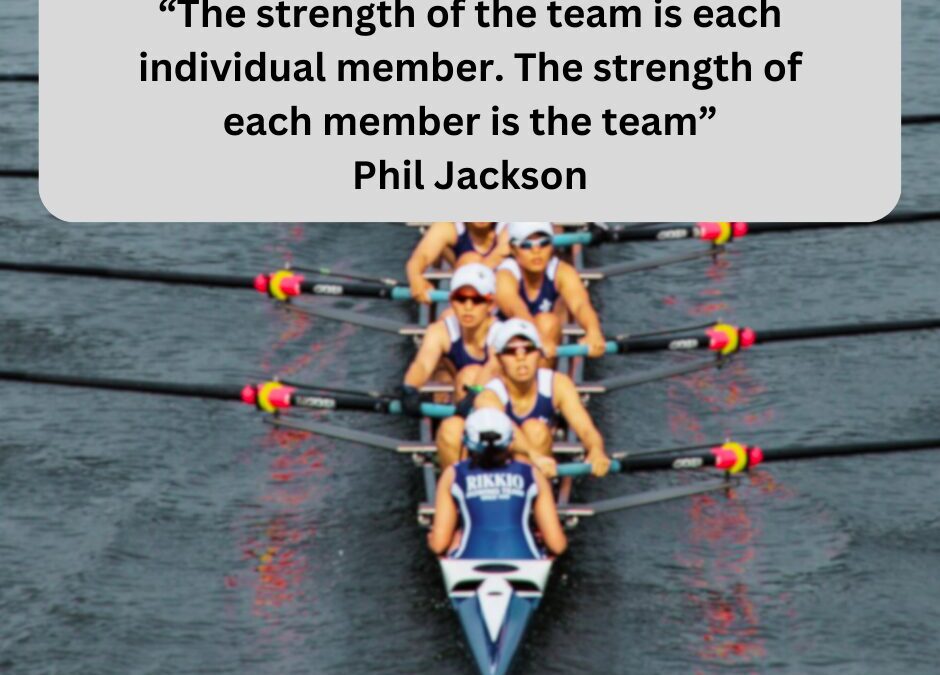
by Julia Felton | Apr 5, 2017
“I’m sure you’ve all heard the adage “Teamwork makes the dream work”, but what exactly is a team and why is teamwork such an illusive quality that provides real competitive advantage?
Have you ever considered that one is a very small number for greatness.
Just think about it, every great enterprise has begun with at a team of at least two people. Bill Gates and Paul Allen founded Microsoft, Steve Jobs and Steve Wozniak led to the founding of Apple, Five talented musicians led to the formation of The Beatles and the story goes on and on.
By channeling the efforts, talents and resources of ourselves and our team members not only can we succeed faster and easier but also, through leveraging our combined resources, we are able to operate as a high performance team, and achieve more.
When individuals and teams are in a peak performance state, they are in a state that is often called Flow, where they are Joined Up and aligned.
Put simply, Flow is the path of least resistance. When team members are in Flow, productivity rises, results increase, occurrences line up, team members have more fun and feel more connected to the organisation.
Flow is a state in which a person is fully immersed in an activity, caught in a feeling of energised focus and full involvement. It is focused motivation, where the emotions are not just contained and channelled but positively energised and aligned with the task at hand.
When people are immersed in Flow, they can experience a distortion of time as their internal clock doesn’t seem to match the external clock. You may have experience this yourself
When team members are feeling stressed, overwhelmed or anxious, it’s a fairly good indicator that they are out of Flow. The opposite is true when they are in Flow, they feel joy and even rapture whilst performing the task; they are fully engaged.
In the work place, Flow can be seen where an individual’s challenges and skills are equally matched, thereby creating a harmonious environment.
When team members are in Flow the following occurs:
- Complete involvement in what they are doing – focused and concentrating
- A sense of ecstasy – a sense of being outside everyday reality
- Greater inner clarity – knowing what needs to be done, and knowing how well they are doing
- Knowing that the activity is doable – that their skills are adequate to the task
- A sense of serenity – no worries about oneself, and a feeling of growing beyond the boundaries of the ego
- Timelessness – thoroughly focused on the present, hours seem to pass by in minutes
- Intrinsic motivation – whatever produces Flow becomes its own reward
As difficult as teamwork is to measure and achieve, its power cannot be denied. When people come together and set aside individual needs for the good of the whole, they can achieve more than would appear possible on paper.
When teams are aligned behind a purpose that everyone resonates with, then office politics and confusion are eliminated. Team members gain a sense of connection and belonging by being part of something and this increases team engagement levels and satisfaction levels.
If you’d like to better understand how to leverage your talents and time, get into flow and discover the roles where you can add most value to a team, you could invest in a Talent Dynamics Assessment. You can purchase it here.
Wishing you a flow filled week.

by Julia Felton | Mar 28, 2017
We all have to make difficult and challenging decisions throughout our life and these decisions often impact the future direction of our lives. Questions such as: Where do I live? Who should I marry?. These are life-changing decisions.
In business, too, we have to make strategic decisions all the time. Should we launch this programme or that programme? Should I enter into a joint venture with this person or that person? Enter this market or that one? These decisions can impact the success or failure of a business.
Yet have you ever stopped to think about how many trivial decisions you make every day? A 2011 study by K. Douglas, reported in the New Scientist, revealed that we make up to 10,000 trivial decisions every day. Often these decisions are so trivial that we don’t fully think about their consequences but over time a number of these trivial decisions can magnify to have a great impact on our lives.
We live in an age when we are deluged in information. A New York Times Weekly edition contains more information than the average person in the seventeenth century would have come across in their entire lifetime. In 2008 we consumed three times as much information as in 1960 and by 2020 it is estimated that we will be generating forty-four times more data than we are producing today. This data deluge brings opportunities, too, as we can now get access to raw, unedited source data rather than having to rely on third party interpretations of the results. And yet when the sources of the data are so disparate and often supply conflicting information, which data source do you believe? How do you know which decisions to prioritise?.
Decision making becomes easier when the purpose of the business is crystal clear. It leads to bolder, quicker and better decisions. Rather than adjusting decisions according to the winds of public opinion or changes in the competitive environment, a purpose driven company takes these things into consideration while also being informed by something more soulful and worthwhile. This leads to superior overall performance. Purpose-informed decision-making is a critical connection between clarity of purpose and superior performance, financially and otherwise.
The US pharmacy chain CVS Health is a great example of a company that made a strategic decision to walk away from billions of dollars a year in revenue because a product was at odds with the company’s purpose. So what was the product and what was the situation?
The purpose of CVS Health is “to help people on their path to better health”. When CEO Larry Merlo realised this he also appreciated that “the sale of tobacco products was inconsistent with our purpose.” So he voluntarily decided to forego a source of $2billion a year in revenue. The decision was an easy one for him to make because of the clarity of the purpose of the company; a classic case of purpose-informed decision making in action.
The art of great decision-making is to ask yourself great questions. Often when we are unable to make decisions it is simply because we are asking the wrong questions. Simply asking the question “Why”, which is a purpose question, immediately helps you get clarity on what to do next.
The Unbridled Business Decision Making Framework is something I share in detail in the new edition of my latest book, Unbridled Business. And if you need help defining the purpose of your business then please reach out to me.

by Julia Felton | Mar 15, 2017
Are you clear on the impact you want to make in the world? Do you know the purpose of your business? These are questions I have pondering on over the last few months as I look at how to reset and re-ignite my business.
The world is changing, business models are changing and the old approaches to business are no longer working. Customers are seeking something more impactful, as are team members. Research by Neilsen has identified that in 2013 54% of consumers opted to purchase products with an environmental and social benefit, up from 20% in 1993.
Furthermore, according to Cone Communications, millennials who are the largest living segment of our economy, represent $2.45 trillion in spending power are 60% more likely to engage with brands that discuss and act on social causes. Combine this with the fact that 53% of millennials say they work harder when they feel the organization is making a difference. Surely it’s time for you to consider what impact and legacy you want your business to leave?
Here are some examples of companies that are making a real environmental and social difference. They have been called Evolved Enterprises:
Toms Shoes: they give a pair of shoes away to a child in need for every pair purchased. To date they have given away 35,000,000 pairs of shoes, which also means that they have sold 35,000.000 pairs of shoes.
Bombas: after learning that socks were the most requested item of clothing at homeless shelters, they set about re-inventing the sock and donate one pair of socks to the homeless shelter for every pair purchased. And in just 18 months they have donated 1,000,000 pairs of socks to the homeless shelters
Warby Parker: have partnered with VisionSpring and now distribute one pair of glasses to someone in need for every pair purchased. By circumventing traditional channels, bypassing retail, designing glasses in house, and engaging with customers directly, they are able to provide eyewear at a fraction of the going price whilst combining that with making an incredible social impact. After just a few years the company is valued at over $1 billion according to the Wall Street Journal
And here’s the really interesting part research continues to show that this is not just a trend but a serious seismic shift. It confirms what you might have felt in your heart already but now the data is backing it up. It is VERY possible to do good in the world and do well for yourself and your company all at the same time.
Research by Raj Sisodia in his book Terms of Endearment reveals that between 1998 – 2013 the cumulative returns of Evolved Enterprises eclipsed the S&P500 by 1400%. That’s a 14 to 1 difference. So it is possible to make a profit whilst also doing good in the world. This is why purpose trumps profit everytime.
However, let’s be clear your reason and purpose to make a difference has to come from a genuine, authentic desire to make a greater impact in the world. Over the last two decades we have seen many companies embrace Corporate Social Responsibility (CSR) initiatives, however, many of these have failed to have real impact because the intention behind them has been flawed. Companies have engaged in CSR activities because they felt they should rather than they really wanted to and really valued the impact they could make. In today’s economy where trust and transparency are paramount applying the Evolved Enterprise framework for the wrong reasons will only fast forward your demise. You have been warned.
I’m really curious to hear about what impact you and your business are making, so please drop me an email and share that with me. And if you’d like to learn more about how you can create a purpose-driven, impactful business then please connect with me and let’s explore what’s possible
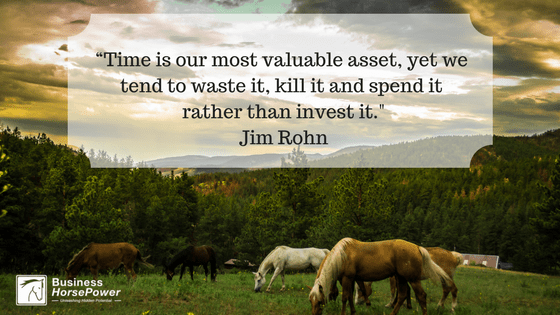
by Julia Felton | Feb 28, 2017
Jim Rohn, one of the pioneers of personal development once said: “Time is our most valuable asset, yet we tend to waste it, kill it and spend it rather than invest it.” and this is as true today as it has ever been.
Time is a very elusive quality. We each have the same amount of time and yet how we use it is very different. How successfully we use the time we have determines our level of success – whether financial, spiritual or emotional.
I was recently reminded of the fact that there are 86,400 seconds in every day. Just imagine that these seconds are money deposited in your account. Every day the same amount of time/money is deposited in your account but the rub is that unless you use the time/money that day you lose it. It doesn’t accumulate. With this mindset what would you do differently to leverage the best use of those 86,400 seconds? Would you watch TV, or would you use it to grow your business or spend time with friends and family? Whatever your decision, it’s one that merits some real thought as all too often we just waste time, kill it and spend it, rather than investing it.
Here are some examples of how to invest your time?
- Read a book
- Learn a new skill
- Develop yourself with coaching and mentoring
- Build relationships with new prospects
- Create new solutions that add value to your clients
This is why I am really excited to be hosting an event next week for a select group of women to help them gain clarity on their top priorities. The art of self-connection is a one day workshop with the horses where I will personally help you get clear on your passion and purpose, understand what is driving you and help you prioritise what to do each and every day to achieve success.
This is a day away from the stresses and strains of daily life, where you are able to slow down, reflect and experience the power of real connection to self and others. A place where you you can invest in yourself and drop into horse time. It is only in this space that we can truly listen to our intuition and so make decisions that are really aligned with what we truly want.
Horses are masters at utilizing time so that it serves them rather than them being a slave to time, so come and experience what is possible when you learn from the masters. You can find out more and reserve your place here. The early bird pricing expires at midnight tonight so act now to secure your place. If you have any questions just give me a call or drop me an email.
Wishing you a super-productive week and I’d love to hear what you are doing to get maximum return on your 86,400 seconds per day, so please get in touch.
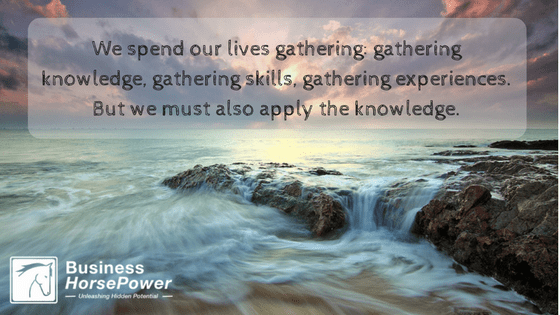
by Julia Felton | Feb 22, 2017
If you who have been part of the Business HorsePower herd for a while you will know that I love learning and acquiring new knowledge. I am always looking for ways to improve myself and the information and services that I share with you, my valued clients.
That is why I have just come back from a four day retreat where I have been developing my speaking skills and learning new strategies to help grow and develop my business. It was a really intense four day experience where I learnt loads. In fact I have come away with nearly an entire notebook full of new information and ideas that I can implement in my business.
Now learning and gathering information is great but here’s the rub. That is not enough. The knowledge and information I have learnt is only of any good if I take action and implement it in my business. And that’s the irony of going on courses. Not only do you have to take time out of your business to go on them, you then need to schedule time when you get back to the office to implement and put all those ideas into action. And if you fail to take action then you have just wasted valuable, time, energy and money.
I will admit to being guilty and oftentimes not implementing what I have learnt, but when you take action, that is when the rubber hits the road and real change and transformation happens. Your business and life will never change by just learning about something. They only change when you take action. And speed is your friend here. The sooner you take action and start implementing what you have learnt, the sooner you will get results.
So have you been implementing all the ideas that I have been sharing with you this year about how to be more productive in order to achieve your goals? If not I suggest you go back and read some of the previous editions of Wednesday Wisdom and start taking small steps now to implement all that I have been sharing.
Taking action is something that I did earlier this year when I was presented with the opportunity to be part of the Purpose, Passion, Profit Summit. And today is the day that you can hear my interview with Helen Vandenburghe on how Entrepreneurial Attention Deficit Disorder (ADD) is impacting the results you are getting in your business. If you haven’t already signed up to the summit you can do so here. I am joined by over 30 other amazing women who have all been sharing great, actionable content on how to get into flow and grow your business. You won’t want to miss this. Grab a pen, listen to the recording, make notes and then take action. Start now by registering for the summit if you have not already done so. You’ll be glad you did
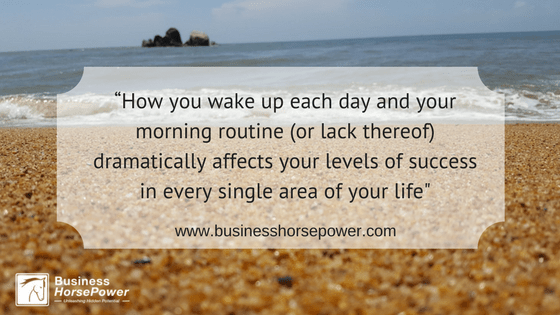
by Julia Felton | Feb 15, 2017
From my extensive research I have found that successful people all have one thing in common. They get up early in the morning and have a very specific routine that they follow, no matter what. It is this routine and consistency each and every morning that sets them up for success.
Starting and maintaining a positive morning routine is an investment of a life time. It provides structure, builds life-changing habits, and creates momentum for the rest of your day. According to research, when you create and follow a morning routine, your stress and anxiety levels will begin to plummet and your life satisfaction levels will begin to soar.
In the words of Hal Elrod, author of The Miracle Morning:
“How you wake up each day and your morning routine (or lack thereof) dramatically affects your levels of success in every single area of your life. Focused, productive, successful mornings generate focused, productive, successful days — which inevitably create a successful life — in the same way that unfocused, unproductive, and mediocre mornings generate unfocused, unproductive, and mediocre days, and ultimately a mediocre quality of life. By simply changing the way you wake up in the morning, you can transform any area of your life, faster than you ever thought possible.”
If you want to make your morning routine stick, focus on making it a habit. A healthy morning routine instills a sense of purpose, peace and productive ritual to your day.
Sir Richard Branson, founder of Virgin Group, says maintaining a good morning routine is no different than having a positive outlook.
“Over my 50 years in business I have learned that if I rise early I can achieve so much more in a day, and therefore in life. No matter where I am in the world, I try to routinely wake up at around 5am. By rising early, I’m able to do some exercise and spend time with my family, which puts me in a great mind frame before getting down to business.”
One of my goals for this year is to instill a better routine into my mornings. One that I stick to no matter what. There is no best formula for how your morning should look but some of the activities that successful people do every day include meditation, exercise, stretching and drinking green smoothies. Then prioritising their top three income producing activities of the day, which they then execute. What they don’t do is get out of bed, react to emails, jump on social media and then find its lunchtime and half the day has already disappeared.
Each and every day there will always be important and urgent tasks that you have to get done, such as client work and sales conversations but there are also a raft of tasks that are important and non-urgent. These important and non-urgent tasks include eating well and making sure you are taking care of yourself. Let’s face it you can serve no-one if you are exhausted and not up to the job. And yet time and time again I come across business owners that have not prioritised their personal well-being in their daily schedule. They keep saying they don’t have time for exercise and yet studies [keep showing] SHOW that exercise helps make us more productive. This is the conundrum. We keep thinking we don’t have time when actually if we don’t take the time to do these things we won’t be able to sustain running a successful business.
Like everything, when you start to implement your morning routine, start with small steps. If you currently get up at 7am then trying to get up at 5am will be a stretch. Why not just get up 15 mins earlier for a week and then the next week another 15 mins earlier. Soon you will reach your goal. Likewise, don’t try and meditate for an hour, 15 mins is a great start. It’s the same with exercise too. If 30 mins seems to long start with just 15 mins. Like everything it is the intention and commitment to take action that is JUST as important as the duration of the activity.
So, what are you going to do today to start putting better morning routines in place? I’m going to take some of my own medicine now and go for a run!
Wishing you a great flow filled week.
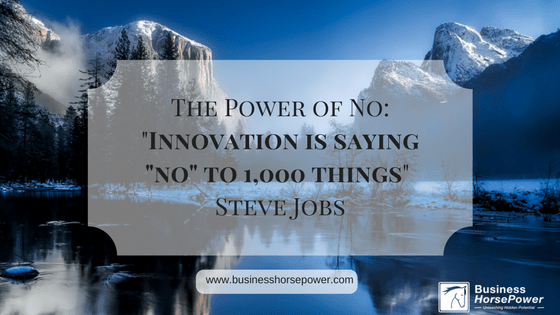
by Julia Felton | Feb 8, 2017
“People think focus means saying yes to the thing you’ve got to focus on. But that’s not what it means at all. It means saying no to the hundred other good ideas that there are. You have to pick carefully. I’m actually as proud of the things we haven’t done as the things I have done. Innovation is saying “no” to 1,000 things” Steve Jobs
Over the past few weeks we have talked a lot about taking action and staying focused, and the quote above from Steve Jobs sums this up so well. Staying focused doesn’t mean saying yes to everything, in fact learning to say No is probably the most powerful action you can take. One of the challenges that I come across time and time again with entrepreneurs is that they want to do everything. Maybe you can relate to this?. Entrepreneurial Attention Deficit Disorder (ADD) is the curse of the entrepreneur because when it kicks in they jump from one project or shiny object to the next. And why is this? It’s because great entrepreneurs can see the opportunity and possibility in everything. And so they just want to pursue all possible options. The challenge is to remain focused when their energy and focus becomes distracted.
So how do you know what to focus on? Firstly, it is so much easier to say No when you are crystal clear what you want to say Yes to. When you have clarity on the reason why you are doing what you are doing, then it is easier to see what a distraction is. This is why, with every business owner I work with, we start by getting clarity on the purpose for the business. The purpose provides the GPS and sets the business owner in the right direction. After all, if for example, you were travelling to Singapore from London, you would instantly know that going to New York was not a sensible idea, as it is in exactly the opposite direction. So having a clear purpose helps you filter out distractions and items that might take you off course.
Having clear values also helps you know what to say No to because your values inform your thinking and actions. If you are asked to undertake a task that is in violation of your values then most likely you would not do it. Our values become our DNA, the basis of what we stand for. Without values we can become like a rudderless ship bobbing around on the ocean, getting swept one way and then the next, never making any progress.
As creative entrepreneurs we often come up with many different types of products and service lines. The reality is that you cannot be an expert at everything. When Mark Parker, become Nike CEO, in 2006, he asked Steve Jobs for his best advice and this is what Jobs said:
“Nike makes some of the best products in the world. Products that you lust after. But you also make a lot of crap. Just get rid of the crappy stuff and focus on the good stuff.”
Jobs calls the process of just focusing on the good stuff editing. It involves reviewing all your products, services and activities and then streamlining them. Whether it’s design or business strategy less is more. Nobody produces all masterpieces. You’ve got to edit it down and throw away the crappy stuff. Take away unnecessary hardware parts from your computer, unnecessary code and features from your app, unnecessary products from your offering, extra words from your presentation. This is not easy. It takes guts to take away a physical keyboard from a smartphone but the results can be astounding. Throw away the crappy stuff and focus on the good stuff.
So, how are you going to use the Power of No in your business? What crappy stuff are you going to release so that you can focus on the really good stuff? Think about this over the coming week and let me know in the Facebook group what you have said No to.















